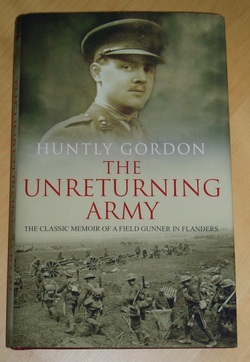
This really is a wonderful book. Gordon’s humanity, his good-nature and general lack of self-pity come shining through, all these years on. I would love to have met this man, who in later life, among other things, initiated food trains during the Blitz for the thousands sheltering in the London Underground.
When I researched the war dead commemorated on the Southborough War Memorial, I had to keep focused on their individual circumstances, as there were over 250 of them, but with every book I read on the First World War, I gain more knowledge. The Unreturning Army doesn't disappoint – it informed my understanding, conveying to me something of the reality of what many of the Southborough and High Brooms men must have gone through.
When I visited Ypres a few years back I went for an early morning run through the Menin Gate Memorial arch and along the Menin Road. Gordon describes the scene in July 1917: “Most of the traffic supplying the line in front of Ypres must pass through here, and the Boche takes heavy toll of it – day and night. The bridge, whether originally arched or not, is now a solid mass of stonework, supplemented, indeed cemented, by the remains of smashed vehicles and the fragmented bodies of horses and men.”
His vivid descriptions of winter conditions for the gunners includes the following account of transporting and setting up the battery from December 1917: "... when darkness fell it began to freeze hard. We did our best to keep warm by huddling together in our doorless carriages, but were stiff and cold when at 2 am we reached the deserted station of Boisleux-au-Mont and were told to off-load ... unloading the horses was a maddeningly slow process, in flurries of snow and a searing wind ... all the ropes were like bars of iron from the intense frost ... somehow or other the job was done at last, and the chill rising sun found us marching through featureless snowy wastes towards our destination ... here the camp site allotted to us was on the exposed top of a ridge, where there was nothing but a few tents to give shelter from the wind. The water troughs had three inches of ice on them, but a pick-axe overcame that difficulty ... the poor horses droop patiently at their ropes, their blankets just keeping them alive ..."
He writes later of being re-united with his war-horse, Fly, after the start of the big German push on 21 March 1918: "Suddenly a horse whinnied. I turned, and there was my beloved mount, Fly, asking for her sugar. She had been pressed into service as lead-horse of a gun-team in another battery. They told me they had found her running loose; and pretty worn out she looked, reduced to a shadow through lack of food and water. But after some forceful discussion with the office in charge, I got her back; and she carried me stout-heartedly for the remaining days of my service."
The men who fought this terrible war often wrote of their ambivalent feelings about the enemy - Gordon writes "What a Mad-Hatter's War this is! Like everyone else I see Germany as an evil enemy, who ruthlessly broke her guarantee to Belgium, and loosed war on her unready neighbours to secure the domination of Europe. Against that we are rightly fighting - for our freedom. But all that is background. The sorry fact remains that I do not hate the Germans personally." And in a period of respite from the fighting, he reflects "For out there, it is not just the Valley of the Shadow, but the very home of Death itself, where neither trees, nor plants, nor birds, nor even soldiers can hope to keep alive for very long." Later on in the book, he "raises my tin-hat" to a German machine-gunner, who forebore to fire on the stretcher-bearers carrying a seriously wounded Gordon away from the spot where he had been hit by an explosive shell fall-out, and without whom "this book could never have been written."
What were soldiers reading in the trenches? Gordon found the Psalms "a very present help in trouble", and also had a copy of Dickens' Pickwick Papers with him. Bruce Bairnsfather's cartoons were, of course, always worth a chuckle from all ranks.
We all have family stories of our grandfathers, great-uncles, etc coming home from the war and having very little to say about their experiences - for what kind of frame of reference could they give them? As Gordon writes of his leave"... there came a seemingly endless succession of friends and relations, who all inanely asked, "How are you getting on out there?" to which I invariably replied, 'Fine, thanks, just fine.' What else could one say? How could they begin to understand? We were now simply in different worlds."
All these years later, this book, writing as it does not only of the humanity and purposefulness of men working together, their stoicism and fortitude, but also the times when their feelings ran out of control, pictures for us many of the things of which they could not speak.
I cannot recommend it too highly.

 RSS Feed
RSS Feed
